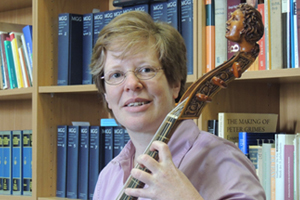'Young and naïve' investigation into composer's life gives researchers a Handel on success
11 June 2014 | Story by Newsroom
UCT partnership with University of Munster awarded prestigious international prize
A piece of research born out of the "youth and naiveté" of its researchers has won a prestigious prize in Germany. Associate Professor Rebekka Sandmeier, Director of the College of Music at the University of Cape Town, and a German colleague, Dr Dominik Höink of the University of Münster, have won the newly created Händel-Forschungspreis in 2014. The prize is awarded by the German Handel Society for outstanding research on the life and work of the composer George Frideric Handel.
The prize-winning project started life as a side product of a different project. Sandmeier and Höink were both working on oratorios that were composed in 19th century Germany by painstakingly working their way through music journals of the time; given how much information there was about Handel's oratorios, they decided to set up a database specific to these performances.
Their research has put facts on what was only guessed at before, and has shown many of these guesses to be incorrect. For instance, it has always been assumed that the Messiah was the most commonly performed oratorio, followed by Judas Macabeus and Israel in Egypt. The Messiah's status has been confirmed - that was no surprise - but in fact the next most commonly performed oratorio was Samson.
Sandmeier and Höink were nominated for the publication Aufführungen von Händels Oratorien im deutschsprachigen Raum (1800-1900): Texte und Rezensionen in ausgewählten Musikzeitschriften, which will be published by V&R unipress in September 2014. The publication was produced with the help of student research assistants, both in Germany and at UCT (Maike Gevers, Nicole d'Oliveira and Itunu Ogunseitan), and in addition to its scholarly merit, was chosen because it introduced students to research on Handel.
Research like this, says Sandmeier, is seldom embarked on by established researchers: "You need to be young to have that kind of vision and naiveté: we only realised after a couple of years what it entailed." However, Handel scholars will be saluting their vision: the publication of their database will open up new fields of investigation for decades to come.
 This work is licensed under a Creative Commons Attribution-NoDerivatives 4.0 International License.
This work is licensed under a Creative Commons Attribution-NoDerivatives 4.0 International License.
Please view the republishing articles page for more information.










